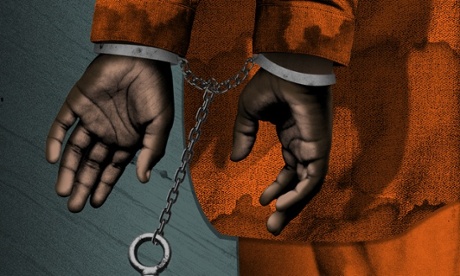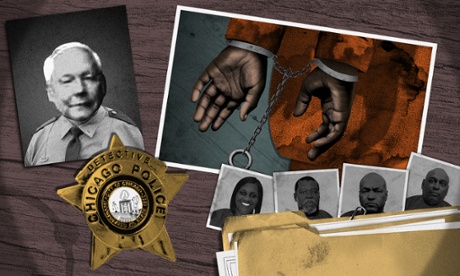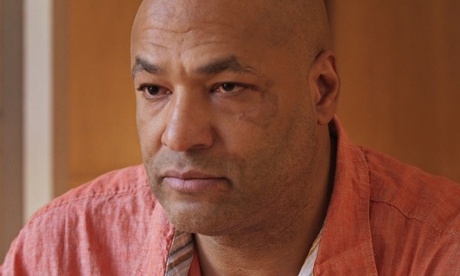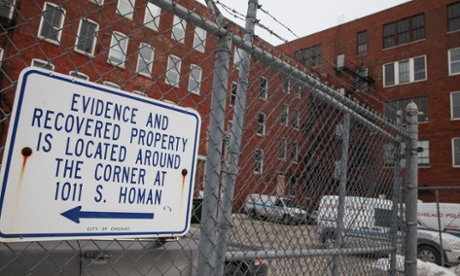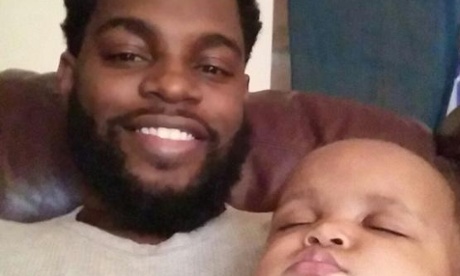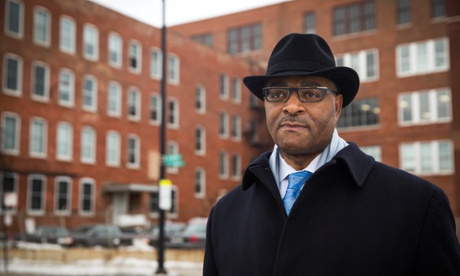Evidence in murder cases investigated by Richard Zuley, the Chicago detective turned Guantánamo Bay torturer, is being freshly examined, with DNA testing central to a new effort to free three people each facing more than 60 years in prison.
Just days after Illinois state officials indicated their own review of the long-time police officer’s civilian-complaint file, Chicago attorney Kathleen Zellner told the Guardian on Thursday she has requested that evidence in the cases of Andre Griggs, Benita Johnson and Lee Harris, who were all convicted on the strength of Zuley’s detective work, are re-examined with the potential for multiple exonerations.
If the wrongful convictions are established, “it’ll be a very strong civil rights case … against Zuley and others,” Zellner said, to serve as a deterrent against future police abuses in a city notorious for them.
“We believe there are probably additional cases.”
Police did not conduct DNA testing at the time on what little physical evidence there was in the cases against Griggs, Johnson and Harris. But now, state of the art forensic and DNA testing may finally be able to determine – definitively – their innocence.
On Tuesday, as the Guardian was preparing to publish an investigation into Zuley’s police work, filings in an Illinois court showed the Cook County state’s attorney office now has an examination open into a second conviction involving Zuley.
While representatives of the state’s attorney’s office told the Guardian that its examination concerns only a single case, the office is seeking civilian complaint files regarding Zuley from a local independent police review authority.
Since state’s attorney Anita Alvarez established a convictions-integrity division in 2012, the unit has voided 10 convictions, and is currently examining 170 others.
Zellner is also representing Lathierial Boyd, whose murder conviction was voided in 2013 after 23 years in prison, in a federal civil-rights lawsuit against Zuley and other police. Having helped exonerate 16 clients already, Zellner said she intends to press forward with the Griggs, Johnson and Harris cases even if the DNA evidence is inconclusive.
Zellner, who has won more exonerations than any other lawyer in the US, is moving forward with re-examinations of what evidence those high-profile cases – in which a white detective sent three black people to prison for killing two white women – actually have.
If DNA tests, requested by Zellner, exonerate the three people Richard Zuley was central in convicting, Zuley’s current civil-rights legal woes are likely to compound.
“We’re going to do a lot of new forensic testing on all these cases,” Zellner told the Guardian.
As detailed in a Guardian series published this week, Andre Griggs, Benita Johnson and Lee Harris were convicted in Chicago murder cases investigated by Zuley. All three 1990s-era convictions depended heavily on interrogations described by the three and detailed in court records as coercive, and were slight on physical evidence connecting the suspects to the crimes.
Griggs and Johnson said that they were shackled to a wall for hours while Zuley and that his colleagues coerced them, successfully, to confess to the 1994 killing of Renee Rondeau.
Benita Johnson said of Zuley: “He did a lot of threatening, hollering in my face, telling me I was gonna lose my kids, I wasn’t going to never get out of prison.
“Every time I would tell him I didn’t know what he was talking about, he would tighten my cuffs up, real tight, against the wall,” she told the Guardian from prison.
“I was scared. They had me sign something and I signed it. But I never even knew nothing about this case. I’m locked up for 20-something years for something I didn’t even know nothing about.”
In late January, Zellner began representing Lee Harris, whose story the Guardian details in the second part of its investigation, published on Thursday.
Harris, initially Zuley’s informant in a 1989 murder of Dana Feitler, was pressed to say he was an eyewitness to the shooting death of Feitler after an ATM robbery, after which Zuley and other police charged him with the crime.
Zellner seeks to test fingerprints on Feitler’s ATM card and withdrawal receipt, latent prints on a dry-cleaning receipt of hers, as well as Feitler’s purse and its contents. That testing is not yet under way.
“They played me like a fine-tuned fiddle,” Harris told the Guardian from prison in Pontiac, Illinois. “One guy who took me in and I thought was my friend introduced me to Zuley, and it was downhill all the way.”
Zuley held out the families of Johnson and Harris as leverage, allegedly telling Johnson she would likely never see her children again if she didn’t confess and implicate Griggs, and paying for hotel stays for Harris, without which he believed his family would be endangered by his informant work. Zuley threatened both Johnson and Griggs with the death penalty, they said.
All those techniques became supercharged when Zuley, a Navy reserve officer, took charge of the Guantánamo Bay torture of Mohamedou Ould Slahi in 2003. Zuley recalls that Zuley threatened to have his mother brought into Guantánamo’s all-male prison environment, which Slahi’s lawyers consider a rape threat.
Another common thread linking Griggs, Johnson, Harris and Slahi is a lack of physical evidence to justify their confinement.
Since June 2013, Zellner has spearheaded DNA testing on a green turtleneck sweater belonging to Renee Rondeau, which Johnson’s family allege police planted on Johnson’s mother’s back porch. Its aim is to separate different DNA profiles on the sweater to see if Johnson’s is present or absent. A detective on her case, Ricardo Abreu, testified at Johnson and Griggs’ 1997 trial that police never tested the sweater for Johnson’s hair.
Another crucial piece of evidence is a mysterious ATM video taken after someone used Rondeau’s bank card post-murder. Zellner intends to enhance the video beyond techniques available in the mid-90s to see if it implicates or exonerates Griggs.
Zuley, since retired from the police force, declined to cooperate with the Guardian’s investigation. Neither he nor the Chicago police department have responded to a lengthy list of questions the Guardian sent them.
Zellner said she intends as well to “determine if there are any other cases Zuley was involved in.”
“The wrongful conviction civil-rights cases are emerging as the most effective way to curb police abuse tactics,” Zellner said. “When it becomes cost-prohibitive to employ officers who frame innocent people, police departments will get rid of these officers or never hire them in the first place.”


